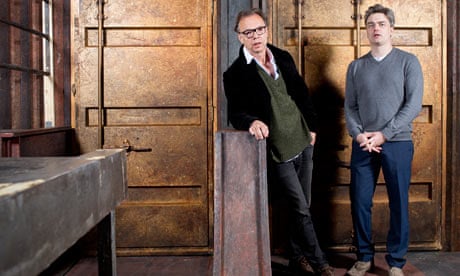Tom Service: This, for both of you, is your first professional Wagner production. Is it a good place for Wagner-virgins in the audience to start?
Jonathan Kent: On the simplest level, it's a fable – the story of the ghostly Dutchman and how Senta dies for her love for him. Surprisingly, there's actually quite a small opera encased in all this vast music, because it's really about just four people: the Dutchman and Senta, her father Daland, and former lover Erik. That simplicity makes it a good way to start with Wagner. And the experience of hearing the piece is just a single, headlong thrust – a white-knuckle ride. Early works by geniuses such as Wagner, or, say, Chekhov's Seagull, fascinate me – these pieces have a rawness, written before their creators had the sophistication of being completely in charge of the medium.
Edward Gardner: I've always loved the heightened fairytale of the story too. And musically, I love composers' beginnings. This piece is really more a beginning for Wagner than any of the operas he'd written previously, like Rienzi.There's a question with Dutchman as to which version you do. We were convinced that it has to be the very first, from 1841, the one that is cast in a single sweep, without an interval. That way, you hear the influence of Beethoven and Weber, especially in the overture. But then the music changes to become arrestingly empty with the first entrance of the Dutchman himself, and suddenly we're somewhere else completely.
TS: Much of the scariness of the sea music in the opera was inspired by Wagner's own experience of a terrifying, stormy sea-journey he made in 1839 with his wife when they were escaping his creditors in Riga and fleeing to London: they even had to shelter in Norwegian fjords before they made it to England. Does all that leave its mark in the music?
EG: I love the terror of the music in the Dutchman, there's a sustaining tide throughout the whole piece. The pacing of it is very cunning: the first act just sweeps you along, in act two there's more space for the characters to develop, and then the third act is just a thrust to the end. It's a visceral experience. And it's completely knackering for the string players! I had no idea before the orchestral rehearsals, but the music has this kind of nervous energy that's incredibly exhilarating. Some pieces leave you drained when you work on them, but this one just makes you slightly manic.
JK: Yes, we're high on it! It's astonishing.
EG: I think Wagner does cut a couple of corners, though, when it comes to the drama. That description of the bond between the Dutchman and Senta – it's very hard to get a sense of that, don't you think, Jonathan?
JK: The way we've done it, it doesn't matter who the Dutchman really is. The point is, he's an escape for Senta, a respite from her own life. Whether it's a genuine love for him that she feels is another question; he is the embodiment of her fantasy of escape. The Dutchman is in eternal exile on the seas – a curse for invoking Satan – and he'll only be freed if he can find someone to love him faithfully. But Senta is also an exile of sorts in her own community, and out of necessity she focuses on this fantasy figure. Our production is a battle between the world of the imagination and the banal reality of our lives. So Senta's world is contemporary, while the Dutchman and the crew of his ghost ship are in 19th-century dress.
The story operates on one level as a ghost story, but it's interesting to penetrate the psychological roots of the myth – the Ancient Mariner, the Wandering Jew. What I love about Wagner's treatment of it is that it's not preoccupied with the crime – the Dutchman's invoking of Satan – it's preoccupied with the punishment. That's what makes it much more interesting, to me, than, say, a Faust or a Don Juan.
EG: Wagner completely brushes over what the Dutchman actually did to deserve his fate: it's mentioned once at the start, and then never again.TS: But ultimately it's Wagner's music that makes us feel for the relationship between the Dutchman and Senta, isn't it?
EG: There's an intense romanticism about this score which is incredibly touching. It has extraordinary moments of beauty and longing. When Senta sees the Dutchman for the first time in act two, there's a string passage that is like a proto-Puccini cadenza that comes out of nowhere. It's just a great emotional gesture; the score is full of those kinds of moments.
TS: What happens at the end of the piece? In the story, Senta dies and the Dutchman is released from his curse, allowing him, too, to die. How are you staging it?
EG: I discovered a lovely stage direction from the original score: Senta joins the Dutchman on his ship, the sea level rises, and then the ship sinks in a maelstrom. I'm not sure how they would have done that back then. I think, especially in the version we're doing, the music sort of hyperventilates towards the end. All that excitement gives us the licence to do what we want with it. And at the very end, after a silence, there are these two brutal chords, it's almost Mahlerian.
JK: If Senta kills herself then I assume he gets his freedom, the bastard! As for how we're doing it – I don't want to give it away. If we get it right, it really will be a white-knuckle ride – musically, narratively, and dramatically, too.
EG: It will have that energy to it. Most of our cast are singing it for the first time, too, so we're all really open about how the piece goes, there's been that excitement throughout the rehearsals.
JK: Honestly, if you're going to do Wagner, or see it for the first time, this really is the best place to start, don't you think?


Comments (…)
Sign in or create your Guardian account to join the discussion